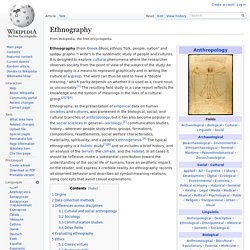

Ethnography. Ethnography (from Greek ἔθνος ethnos "folk, people, nation" and γράφω grapho "I write") is the systematic study of people and cultures.

It is designed to explore cultural phenomena where the researcher observes society from the point of view of the subject of the study. An ethnography is a means to represent graphically and in writing the culture of a group. The word can thus be said to have a "double meaning," which partly depends on whether it is used as a count noun or uncountably.[1] The resulting field study or a case report reflects the knowledge and the system of meanings in the lives of a cultural group.[2][3][4] Origins[edit] Gerhard Friedrich Müller developed the concept of ethnography as a separate discipline whilst participating in the Second Kamchatka Expedition (1733–43) as a professor of history and geography.
International Catholic University 45.10. International Catholic University : Twentieth-Century Ethics David Solomon Welcome back.

In the last lecture, I talked about Alasdair MacIntyre's remarkable book, After Virtue, which has changed the shape of contemporary moral philosophy. That book, of course, is an instance of one of the three classical forms of normative theory which we distinguished in the 5th lecture. MacIntyre both argues that virtue ethics is our best normative option in the 20th century and offers us one way to think about what such a theory would look like in the modern world. A number of philosophers have agreed with MacIntyre about the failure of modernity's attempts to justify morality, but have thought his attempt to recover the classical tradition of virtue ethics is also a failure. Despite their many differences, anti-theorists are united in their sense that there is something deeply misguided about the ambitions of many contemporary normative theories. Required Readings: Suggested Readings: Study Questions: Paul Dourish. Harold Garfinkel. Harold Garfinkel (October 29, 1917 – April 21, 2011) was an American sociologist, ethnomethodologist, and a Professor Emeritus at the University of California, Los Angeles.

He is known for establishing and developing ethnomethodology as a field of inquiry in sociology. He published multiple books throughout his lifetime and is well known for his book, Studies in Ethnomethodology, which was published in 1967. Biography[edit] After the war, Garfinkel went to study at Harvard and met Talcott Parsons at the newly formed Department of Social Relations at Harvard University.[11] While Parsons studied and emphasized abstract categories and generalizations, Garfinkel's work was more focused on detailed description.[12] "What set Garfinkel apart from Parsons's other students and colleagues was his extreme commitment to empirical studies.
Garfinkel's thought[edit] Influences[edit] Ethnomethodology was not designed to supplant the kind of formal analysis recommended by Parsons. Rationality[edit] 1. About Ethnomethodology. Ethnomethodology is the study of methods people use for understanding and producing the social order in which they live.[1] It generally seeks to provide an alternative to mainstream sociological approaches.[2] In its most radical form, it poses a challenge to the social sciences as a whole.[3] On the other hand, its early investigations led to the founding of conversation analysis, which has found its own place as an accepted discipline within the academy.

According to Psathas, it is possible to distinguish five major approaches within the ethnomethodological family of disciplines.[4] Definition[edit] The term's etymology can be broken down into its three constituent parts: ethno - method - ology, for the purpose of explanation. Origin and scope[edit] This interest developed out of Garfinkel's critque of Talcott Parsons' attempt to derive a general theory of society. Theory and methods[edit] Some leading policies, methods and definitions[edit] Differences with sociology[edit] Approach from Ethnomethodology. Ethnomethodology is a technique that originated as an antithesis to the cognitive theories.

In it’s most pure form ethnomethodology is an anti-theoretical approach built around understanding social systems and networks through observational research. Ethnomethodology can still be seen today from ethnographic studies. Ethnomethodology takes the shape of a narrative or prose-like writing that aims to provide the reader with an understanding of a person or group’s social behavior during a period of time. While a few ethnomethodologists summarized their findings to make design recommendations in the field, many were uncomfortable with the idea of trying to take ideas and patterns found in the research out of the context it was found in. In that way true ethnomethodology only accomplishes the descriptive aspect of theory and does not try to predict, or apply observations to circumstances.